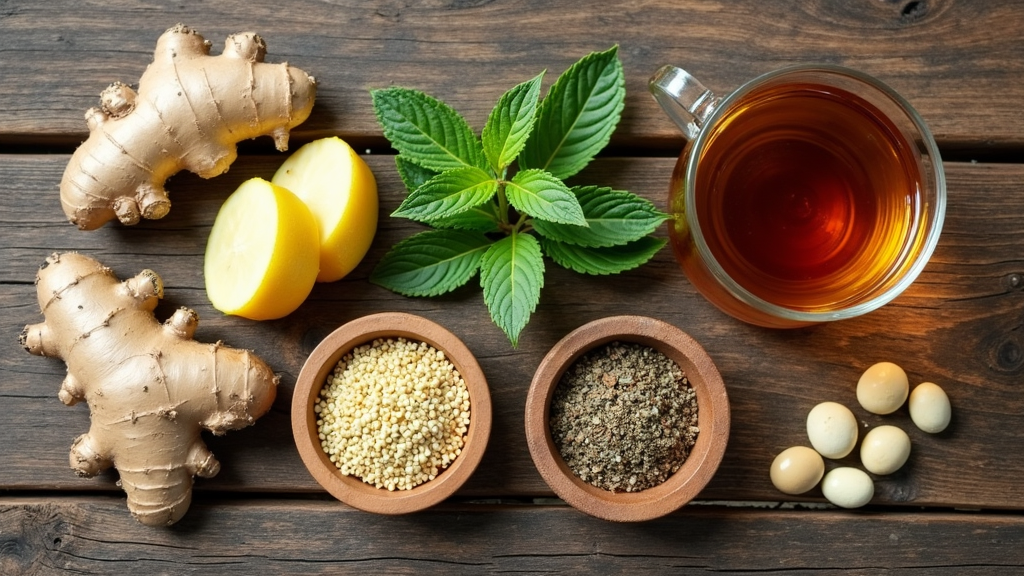
Digestive health can shape everything from your energy levels to how you feel day to day, and several natural ways exist to give your gut a needed boost. Herbal supplements are pretty handy if you’re dealing with problems like bloating, gas, or just want to keep your digestion humming along. In this all-in-one guide, let’s dig into the best herbal options and see how they can help keep your digestive system running smoothly.
Herbal Supplements for Digestive Support
What Are Herbal Supplements?
Herbal supplements are made from plants—roots, leaves, seeds, and even flowers—that have been used for generations to support wellness. When it comes to digestion, some herbs help get things moving, while others calm the gut or tone down unwanted discomfort after meals. Many people find them extra helpful when combined with a balanced diet, ample water, enough sleep, and an active lifestyle. Herbs can often be found as teas, capsules, tinctures, or powders.
Who Might Benefit from Herbal Digestive Aids?
- Anyone dealing with bloating or trapped gas after meals
- People experiencing now-and-then indigestion or acid reflux
- Folks with sensitive digestive systems, like those with mild IBS
- Anyone interested in natural options to give a boost to their gut
Things to Consider Before Using Herbal Supplements
- Possible interactions with medications
- Allergies or sensitivities to certain plants
- Quality and reputation of the supplement brand
- Checking in with a healthcare provider, especially with ongoing symptoms
It’s important to do some reading up if you’re new to herbal supplements, and always pay attention to how your body responds. Some herbs work gently, but others can be strong and affect everyone differently.
Top Herbal Supplements for Digestive Health
- Peppermint Oil
One of the most popular options for gas and bloating. Peppermint oil is well known for calming the muscles in the gut and works especially well for folks with irritable bowel syndrome (IBS). Enteric-coated capsules can help you avoid heartburn. - Ginger
A kitchen staple and a favorite for soothing nausea and sluggish digestion. Components like gingerols boost saliva and bile, getting food moving along. Enjoy as tea, in food, or in convenient capsules. - Turmeric (Curcumin)
Helps keep inflammation under control throughout the digestive tract. This can ease symptoms in conditions like IBS or mild ulcerative colitis. Curcumin absorbs best with a bit of black pepper included. - Fennel Seed
Chewing fennel seeds or drinking fennel tea helps get rid of bloating and cramps for many people. As a carminative, fennel supports your body in letting go of extra gas. - DGL Licorice
Licorice root, especially in its DGL form (which removes glycyrrhizin for safety), soothes the lining of the stomach. DGL lozenges are helpful for calming acid reflux or soothing mild irritation. - Slippery Elm
This herbal powder gets gooey when mixed with water, creating a coat along the stomach and intestines. It’s a good option if you’re sensitive to heartburn or have gut flare-ups now and then. - Chamomile
Known for its relaxing powers, chamomile not only serves up a calming tea but also helps settle stomach muscles. It’s handy for lowering discomfort from indigestion or mild stomach spasms. - Artichoke Leaf Extract
Artichoke isn’t just for salads; its leaf extract gets the liver to produce more bile, which helps your body break down fats. This can bring relief after eating rich, heavy foods.
There are even more herbs with stomach-soothing notes, but these are among the easiest to find and use.
Picking the Right Herbal Supplement for Common Digestive Issues
For IBS Symptoms
- Peppermint Oil: Soothes gut spasms and calms bloating.
- Fennel Seed: Eases gas and gentle enough to use daily.
- Ginger: Supports gut movement, helping both constipation and diarrhea.
- Turmeric: Useful for toning down mild inflammation.
If You’re Experiencing Bloating or Gas
- Fennel Seed: Let’s gas move along and brings quick relief.
- Peppermint: Calms gut muscles so gas can pass more easily.
- Chamomile: Settles the gut after a big or heavy meal.
- Ginger: Helps break up gas bubbles and get things moving.
For Heartburn or Acid Reflux
- DGL Licorice: Protects and soothes the stomach lining.
- Slippery Elm: Forms a soothing shield against acid irritation.
- Marshmallow Root: Like slippery elm, offers a protective layer to the gut.
- Chamomile: Lowers mild inflammation and soothes the esophagus.
Sluggish Digestion or Indigestion
- Ginger: Good for triggering digestive juices and moving things along.
- Artichoke Leaf: Helps break down fats.
- Gentian Root: A bitter herb that gets your stomach to release more acid and enzymes.
- Peppermint: Use it if you feel bogged down after meals.
If you’re not sure which option to use, start with one herb at a time for a week or two and pay attention to how your body feels.
Side Effects and Safety Tips
- Follow labeled dosages and stick to trusted brands with good reviews.
- Some herbs, like licorice, shouldn’t be mixed with certain medications (such as blood pressure drugs) unless you chat with your healthcare provider first.
- If you’re pregnant, breastfeeding, or have chronic health conditions, double-check with your healthcare provider before trying new supplements.
- Allergic reactions are possible, so start with a small amount when trying something new. Also, watch for any changes in how you feel.
What Real Users Say
- Peppermint Oil: Many with IBS see less pain and bloating after just a week or two.
- Ginger: Often used as a go-to for nausea and meals that “sit heavy.” Ginger tea is a daily comfort for some.
- Fennel Seed: Praised for quick relief after big meals, with a mellow flavor most people can handle.
- Chamomile: A regular favorite for evening tea as it both helps with digestion and relaxation.
These herbs offer unique support, but not every herbal remedy works for everyone. Trying options one by one helps you figure out what suits your body best. Quality is key, so always choose reliable supplement brands and listen to your body’s feedback. With patience and good choices, you can naturally keep your digestive health on track and feel your best every day.
